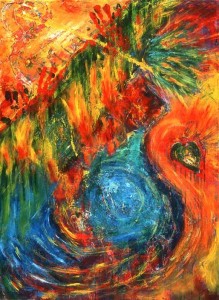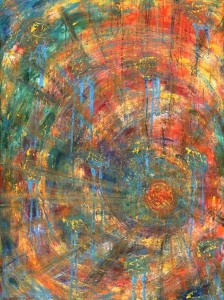 I don’t mean religious faith that is fraught with layers of doctrine and moral dictates. And I don’t mean faith in institutions or in public figures, be they civic or spiritual. I’m talking about really basic stuff here: the ability to open up to oneself or to another without grasping for control.
I don’t mean religious faith that is fraught with layers of doctrine and moral dictates. And I don’t mean faith in institutions or in public figures, be they civic or spiritual. I’m talking about really basic stuff here: the ability to open up to oneself or to another without grasping for control.
I find that I have no problem opening up to others, but I have real problem letting go and giving up control of the situation. It’s not that it will get out of hand. Rather it’s that I’m afraid of losing myself in it.
This is what James Dickson zeroed in on when he met me. He sensed my yearning for connection and at the same time my self-sabotaging which constantly prevented me from achieving true intimacy. He ends his Twelve Powerful Words Needed for Spiritual Fulfillment with Faith. He states that once I know deeply my unity with the universe (see previous post) I would be able to experience faith and therefore trust in who I am and what I’m about. Unity with the other will enable me to let go of control and just “be.”
So how did a priest for 32 years and a committed Christian since youth lose his faith? Maybe it’s because I never had it. Very early in life I learned to be wary of the minefield we call the world. I felt something was missing in me that made it difficult to negotiate the world (and have since discovered that it’s being wired as highly sensitive). I constantly compared myself with others to check and see if I were “normal”. This only magnified my sense of isolation and eroded what little faith I might have had.
As an adult I learned to abandon my heart in favor of my head. The risk of feeling deeply was simply too great and the sensation too intense. Despite some profoundly transcendent spiritual experiences, my heart remained torpid. Even love could not be trusted to soften my defenses.
The source of my unease was my quietly seething resentment toward God for whom I professed love, but who I blamed for what I considered to be an abnormal life (self-pity and victimhood played a huge part). I wanted to be rescued and be given the life I thought I ought to have. I looked to God and then to the church but kept having to peer into the mirror and face my empty heart.
The more I yearned for outside recognition the less I got, or maybe the less I was able to perceive. My anger and envy blinded me to how I would sometimes come across to people. My tone, self-expression, opinions, candor, and idealism belied a deeper unease. Like the emperor, I was the last person to know that I had nothing on. Having little faith in myself per se I depended on concrete accomplishments to give me value and when they were not forthcoming, I dried up inside.
 Have I found faith? Honestly, faith is momentary. I constantly move into and out of a state of trust. This is actually a good thing because now I am conscious of my inner spirit. I can sense with gratitude what trust feels like in the moment and forgive myself when those moments pass. Even so, I constantly second-guess myself because I want people to like me and not push me aside. But I know that’s not really the issue; I have to stop pushing myself aside and show up in the world in my totality. So have I found faith? At this stage the answer is Yes and No…a vast improvement with plenty of room to grow!
Have I found faith? Honestly, faith is momentary. I constantly move into and out of a state of trust. This is actually a good thing because now I am conscious of my inner spirit. I can sense with gratitude what trust feels like in the moment and forgive myself when those moments pass. Even so, I constantly second-guess myself because I want people to like me and not push me aside. But I know that’s not really the issue; I have to stop pushing myself aside and show up in the world in my totality. So have I found faith? At this stage the answer is Yes and No…a vast improvement with plenty of room to grow!
Contact me at michael@parisecoaching.com
(artwork copyrighted 1999 by Michael Parise)

Hi Michael
That was very introspective, and thanks for sharing that. In your message, I found similar tones to my own journey, in keeping the emotional distance. For me, that was my form of protection. I learned very early, after being emotionally crushed, one way or another, that the only way I could survive, would be to simply disconnect.
There came a time, when I realized that now I’m grown. Now I am not that same child who so often felt helpless. So I began my own long journey of self discovery, to once again tune into the emotional connection of those in the world around me. Like you, I am still a work in progress.
I think ‘faith’ is often used when another word may be more appropriate. Faith is the tool I used when taking my first steps. It was the belief that my security, my self worth, my connection to the world must be true. It was the notion, that no matter what experiences I have in this physical world, that in the end, I am eternal and enveloped in the unconditional state of love that truly builds the whole universe.
In having ‘faith’ I had the intellectual understanding that those things must be true. It is the intellectual belief, the first step toward the understanding in the heart. When that understanding falls within the heart, then that ‘faith’ is transformed into knowingness.
For when we know something to be true, faith is a mute issue. If I know the sun will rise in the morning, it is not faith that holds my belief, it is knowingness. And knowingness is the absence of doubt. Faith, contains a seed of doubt.
That was a very powerful statement you presented, that once we know our connection to the universe, we will be filled with faith. I suggest, when we know that connection, when we truly know it, then by definition we no longer need the crutch of faith – for now we know!
That knowingness is trust. Trust in the unfolding experience of the physical world. The knowingness that we create our experience from within; and that the universe only reflects our image in experience. And trust that no matter what we create, we are ultimately infinite co-creators held in the state of unconditional love.